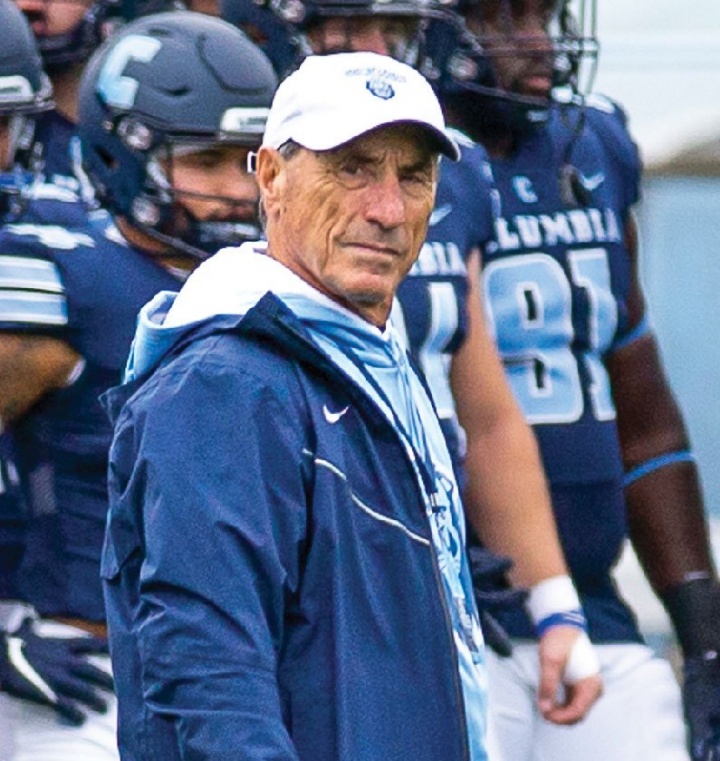Columbia College | Columbia University in the City of New York
Al Bagnoli Brought Back Lions Football Pride

COLUMBIA UNIVERSITY ATHLETICS / MIKE McLAUGHLIN
At the time I was five years into my tenure as editor-in-chief of CCT. “Five or six,” I said, “but remember, before I took this job I was away from Columbia for more than 25 years.”
He smiled and shook his head. “Yeah, you missed a few in between.”
In any business, frequent turnover often is a sign of failure, stability a mark of success. When Al Bagnoli took over in February 2015, he inherited a program that had churned through three head coaches in a dozen years (10 since I’d arrived on campus as a first-year in 1967). But Bagnoli, who announced his retirement from coaching in August for health reasons, brought much-needed stability to the Columbia football program. At the time, it seemed like an impossible dream — those Lions were a non-competitive, dispirited football team that was losing games at an alarming rate and losing players as fast as they could be recruited.
Coming off consecutive 0–10 seasons under Coach Pete Mangurian, the team seemed poised to do the unimaginable: make a run at the infamous 44-game losing streak of 1983–88, then the longest in college football history.
Bagnoli, meanwhile, was at Penn, having been moved upstairs following two losing seasons at the end of a stellar 23-year run during which the Quakers had won nine Ivy League championships. But Bagnoli, who had compiled a 148–80 record at Penn, had grown antsy as an administrator and jumped at the opportunity to return to the sidelines at Columbia.
His success was by no means a sure thing. Unlike perennially powerful Penn, Columbia had a losing tradition, with just five winning seasons since the Ivy League began football play in 1956. Skeptics questioned whether Bagnoli, then 62, would be able to inject the necessary energy and enthusiasm into the program or whether he was taking the job for one last big payday before retirement.
Bagnoli proved them wrong. It took two years to scrape off the barnacles, but by the time his second full recruiting class arrived on campus in 2017, Bagnoli had planted the seeds for a successful culture change and was about to reap the rewards. His mantra: Make football fun again.
The 2017 team offered a peek at things to come. In its season opener, against Wagner, the Lions drove 54 yards to set up Oren Milstein ’20’s 29-yard field goal as time expired for a 17–14 win. Spirit and confidence seemed to grow by the week, and by the time the Lions rolled into October’s Homecoming game — coincidentally against Bagnoli’s old team — they’d added three more wins for a 4–0 record.

Making football fun again: The Lions celebrate after their 34–31 Homecoming win over Penn in October 2017.
COLUMBIA UNIVERSITY ATHLETICS / MIKE McLAUGHLIN
The first three quarters belonged to Penn but seemingly out of nowhere Columbia scored three touchdowns to take the lead. A Quakers touchdown with 1:21 to play forced overtime, but Columbia’s defense held Penn to a field goal on the opening possession and then Anders Hill ’18 completed a pass to Josh Wainwright ’21 for a 24-yard touchdown and a 34–31 win. Hundreds of students, alumni and fans poured onto the field to join players and coaches to celebrate the victory.
The difference between that joyous scene and the atmosphere that had surrounded the team in Bagnoli’s first two seasons was striking. As co-captain and defensive back Landon Baty ’19 said, “For so long, football has been a blemish on Columbia University. But now, it’s something to take pride in.”
Most importantly, that 8–2 season was not an anomaly. Bagnoli led the Lions to a 6–4 record in 2018 and to winning slates in four of the last five seasons (the 2020 campaign was cancelled due to the pandemic). Not since the 1930s Lions teams coached by Lou Little, including the squad that won the 1934 Rose Bowl, had Columbia compiled a similar string of success.
When Bagnoli, now 70, announced his retirement, he had unfinished business at Columbia. Despite a stellar career won-lost record of 269–134, he never led the Lions to the Ivy League championship, and his record at Columbia was 35–35, just one win shy of a winning mark, something even the legendary Little did not achieve.
But one of the time-honored measures of success is leaving a place in better shape than when you got there. Bagnoli did just that as the Columbia’s 20th head football coach.
Alex Sachare ’71 is a former sports editor of Spectator and a contributing editor to and former editor-in-chief of CCT.
Issue Contents
Published three times a year by Columbia College for alumni, students, faculty, parents and friends.
Columbia Alumni Center
622 W. 113th St., MC 4530, 6th Fl.
New York, NY 10025
212-851-7852
cct@columbia.edu
Columbia Alumni Center
622 W. 113th St., MC 4530, 4th Fl.
New York, NY 10025
212-851-7488
ccalumni@columbia.edu

